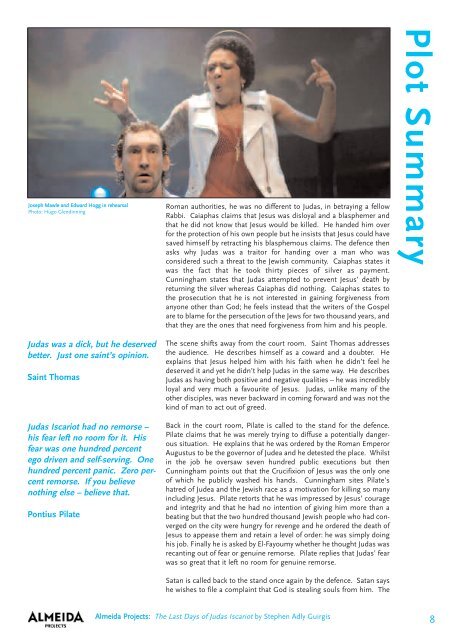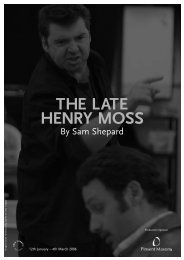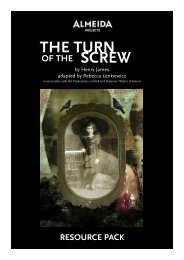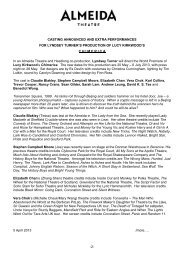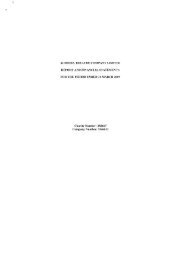The Last Days of Judas Iscariot - Almeida Theatre
The Last Days of Judas Iscariot - Almeida Theatre
The Last Days of Judas Iscariot - Almeida Theatre
Create successful ePaper yourself
Turn your PDF publications into a flip-book with our unique Google optimized e-Paper software.
Joseph Mawle and Edward Hogg in rehearsal<br />
Photo: Hugo Glendinning<br />
Roman authorities, he was no different to <strong>Judas</strong>, in betraying a fellow<br />
Rabbi. Caiaphas claims that Jesus was disloyal and a blasphemer and<br />
that he did not know that Jesus would be killed. He handed him over<br />
for the protection <strong>of</strong> his own people but he insists that Jesus could have<br />
saved himself by retracting his blasphemous claims. <strong>The</strong> defence then<br />
asks why <strong>Judas</strong> was a traitor for handing over a man who was<br />
considered such a threat to the Jewish community. Caiaphas states it<br />
was the fact that he took thirty pieces <strong>of</strong> silver as payment.<br />
Cunningham states that <strong>Judas</strong> attempted to prevent Jesus’ death by<br />
returning the silver whereas Caiaphas did nothing. Caiaphas states to<br />
the prosecution that he is not interested in gaining forgiveness from<br />
anyone other than God; he feels instead that the writers <strong>of</strong> the Gospel<br />
are to blame for the persecution <strong>of</strong> the Jews for two thousand years, and<br />
that they are the ones that need forgiveness from him and his people.<br />
Plot Summary<br />
<strong>Judas</strong> was a dick, but he deserved<br />
better. Just one saint’s opinion.<br />
Saint Thomas<br />
<strong>Judas</strong> <strong>Iscariot</strong> had no remorse –<br />
his fear left no room for it. His<br />
fear was one hundred percent<br />
ego driven and self-serving. One<br />
hundred percent panic. Zero percent<br />
remorse. If you believe<br />
nothing else – believe that.<br />
Pontius Pilate<br />
<strong>The</strong> scene shifts away from the court room. Saint Thomas addresses<br />
the audience. He describes himself as a coward and a doubter. He<br />
explains that Jesus helped him with his faith when he didn’t feel he<br />
deserved it and yet he didn’t help <strong>Judas</strong> in the same way. He describes<br />
<strong>Judas</strong> as having both positive and negative qualities – he was incredibly<br />
loyal and very much a favourite <strong>of</strong> Jesus. <strong>Judas</strong>, unlike many <strong>of</strong> the<br />
other disciples, was never backward in coming forward and was not the<br />
kind <strong>of</strong> man to act out <strong>of</strong> greed.<br />
Back in the court room, Pilate is called to the stand for the defence.<br />
Pilate claims that he was merely trying to diffuse a potentially dangerous<br />
situation. He explains that he was ordered by the Roman Emperor<br />
Augustus to be the governor <strong>of</strong> Judea and he detested the place. Whilst<br />
in the job he oversaw seven hundred public executions but then<br />
Cunningham points out that the Crucifixion <strong>of</strong> Jesus was the only one<br />
<strong>of</strong> which he publicly washed his hands. Cunningham sites Pilate’s<br />
hatred <strong>of</strong> Judea and the Jewish race as a motivation for killing so many<br />
including Jesus. Pilate retorts that he was impressed by Jesus’ courage<br />
and integrity and that he had no intention <strong>of</strong> giving him more than a<br />
beating but that the two hundred thousand Jewish people who had converged<br />
on the city were hungry for revenge and he ordered the death <strong>of</strong><br />
Jesus to appease them and retain a level <strong>of</strong> order: he was simply doing<br />
his job. Finally he is asked by El-Fayoumy whether he thought <strong>Judas</strong> was<br />
recanting out <strong>of</strong> fear or genuine remorse. Pilate replies that <strong>Judas</strong>’ fear<br />
was so great that it left no room for genuine remorse.<br />
Satan is called back to the stand once again by the defence. Satan says<br />
he wishes to file a complaint that God is stealing souls from him. <strong>The</strong><br />
<strong>Almeida</strong> Projects: <strong>The</strong> <strong>Last</strong> <strong>Days</strong> <strong>of</strong> <strong>Judas</strong> <strong>Iscariot</strong> by Stephen Adly Guirgis<br />
8


